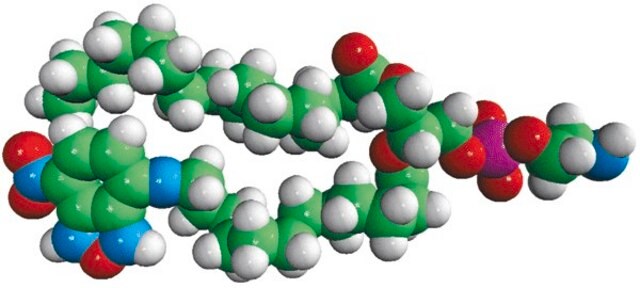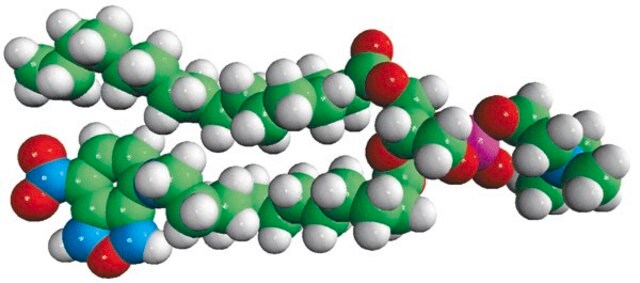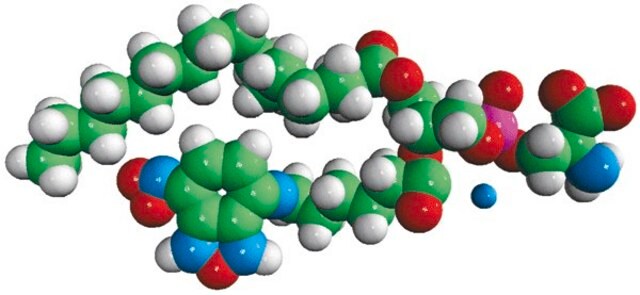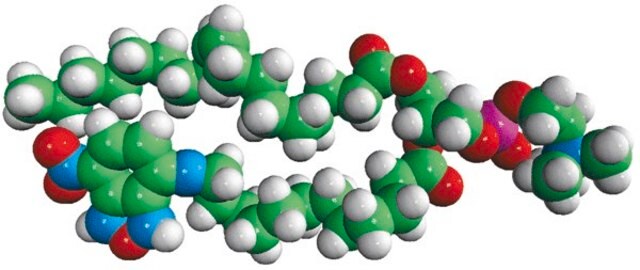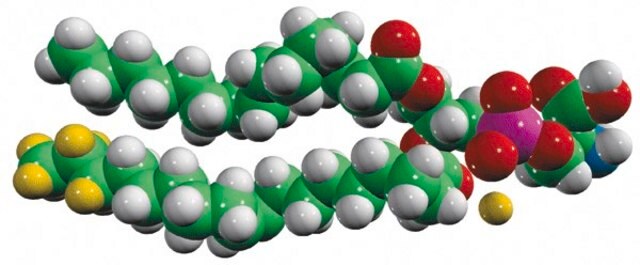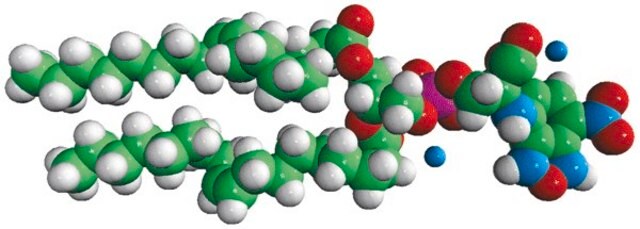810193C
Avanti
16:0-12:0 NBD PS
Avanti Research™ - A Croda Brand 810193C
동의어(들):
1-palmitoyl-2-{12-[(7-nitro-2-1,3-benzoxadiazol-4-yl)amino]dodecanoyl}-sn-glycero-3-phosphoserine (ammonium salt)
로그인조직 및 계약 가격 보기
모든 사진(2)
About This Item
실험식(Hill 표기법):
C40H71N6O13P
CAS Number:
Molecular Weight:
875.00
MDL number:
UNSPSC 코드:
12352211
NACRES:
NA.25
추천 제품
분석
>99% (TLC)
양식
liquid
포장
pkg of 1 × 1 mL (810193C-1mg)
제조업체/상표
Avanti Research™ - A Croda Brand 810193C
농도
1 mg/mL (810193C-1mg)
배송 상태
dry ice
저장 온도
−20°C
일반 설명
Phosphoserine (PS) is present in the intracellular membranes and grey matter, and isenriched in the cytosolic leaflet of plasma membrane. NBD PS is a fluorescently labelled lipid with 7-nitrobenz-2-oxa-1,3-diazol-4-yl (NBD) at the headgroup of PS.
애플리케이션
16:0-06:0 NBD PS or 1-palmitoyl-2-{6-[(7-nitro-2-1,3-benzoxadiazol-4-yl)amino]hexanoyl}-sn-glycero-3-phosphoserine (ammonium salt) may be used in the liposome preparation for in vitro assay of the phosphatidylethanolamine (PE) production by determining the phosphatidylserine decarboxylase 1 (Psd1p) activity.
생화학적/생리학적 작용
Phosphatidylserine (PS) regulates numerous enzymes and structural components maintains the nerve cell membrane and myelin sheath.
포장
5 mL Amber Glass Screw Cap Vial (810193C-1mg)
법적 정보
Avanti Research is a trademark of Avanti Polar Lipids, LLC
신호어
Danger
Hazard Classifications
Acute Tox. 3 Inhalation - Acute Tox. 4 Oral - Aquatic Chronic 3 - Carc. 2 - Eye Irrit. 2 - Repr. 2 - Skin Irrit. 2 - STOT RE 1 - STOT SE 3
표적 기관
Central nervous system, Liver,Kidney
Storage Class Code
6.1D - Non-combustible acute toxic Cat.3 / toxic hazardous materials or hazardous materials causing chronic effects
WGK
WGK 3
Flash Point (°F)
does not flash
Flash Point (°C)
does not flash
가장 최신 버전 중 하나를 선택하세요:
Yasushi Tamura et al.
The Journal of biological chemistry, 287(52), 43961-43971 (2012-11-06)
Phosphatidylethanolamine (PE) plays important roles for the structure and function of mitochondria and other intracellular organelles. In yeast, the majority of PE is produced from phosphatidylserine (PS) by a mitochondrion-located PS decarboxylase, Psd1p. Because PS is synthesized in the endoplasmic
Jean E Vance et al.
Progress in lipid research, 44(4), 207-234 (2005-06-28)
Phosphatidylserine (PS) is a quantitatively minor membrane phospholipid that is synthesized by prokaryotic and eukaryotic cells. In this review we focus on genes and enzymes that are involved in PS biosynthesis in bacteria, yeast, plants and mammalian cells and discuss
Ouma Onguka et al.
The Journal of biological chemistry, 290(20), 12744-12752 (2015-04-02)
Phosphatidylethanolamine (PE) is a major cellular phospholipid that can be made by four separate pathways, one of which resides in the mitochondrion. The mitochondrial enzyme that generates PE is phosphatidylserine decarboxylase 1 (Psd1p). The pool of PE produced by Psd1p
Soumi Mukherjee et al.
Chemistry and physics of lipids, 127(1), 91-101 (2004-01-07)
Lipids that are labeled with the NBD (7-nitrobenz-2-oxa-1,3-diazol-4-yl) group are widely used as fluorescent analogues of native lipids in biological and model membranes to monitor a variety of processes. NBD-labeled lipids have previously been used to monitor the organization and
Michael J Glade et al.
Nutrition (Burbank, Los Angeles County, Calif.), 31(6), 781-786 (2015-05-03)
The aim of this study was to assess the roles and importance of phosphatidylserine (PS), an endogenous phospholipid and dietary nutrient, in human brain biochemistry, physiology, and function. A scientific literature search was conducted on MEDLINE for relevant articles regarding
자사의 과학자팀은 생명 과학, 재료 과학, 화학 합성, 크로마토그래피, 분석 및 기타 많은 영역을 포함한 모든 과학 분야에 경험이 있습니다..
고객지원팀으로 연락바랍니다.